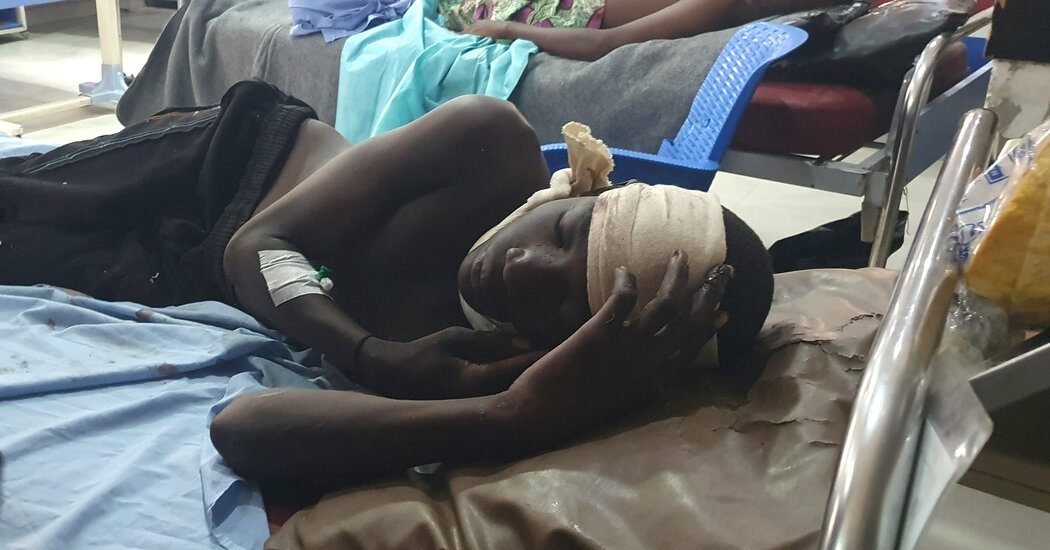A woman held a baby as she detonated a bomb over the weekend in northern Nigeria, killing them both and at least half a dozen others, the local authorities said, putting an abrupt end to a rare lull in the violence that has plagued the region for over a decade.
She was joined by two other female suicide bombers in Nigeria’s Borno State who killed at least 32 and wounded dozens more in a series of bombings, according to Vice President Kashim Shettima. The attacks, experts said, demonstrated the complex and deadly role women can play in terrorist insurgencies like Boko Haram.
The attackers struck three locations — a wedding celebration, an area near a hospital and a funeral service for the victims of the earlier bombing, said Barkindo Saidu, the director general of Borno State’s emergency management agency. The attacks took place in Gwoza city, an area formerly controlled by Boko Haram for 15 years.
Though no organization has yet claimed responsibility, the attacks are similar to previous suicide bombings carried out by Boko Haram, an Islamist group responsible for tens of thousands of deaths and the displacement of over two million people in the region. Boko Haram made headlines in 2014 after kidnapping more than 200 schoolgirls.
Women are sent to death because they ‘blend in.’
Armed groups often use women as suicide bombers because they consider them less valuable to the organization and more tactically advantageous, experts said.
“The women arouse less suspicious, and they are able to penetrate targets more deeply,” said Mia Bloom, a professor of communication at Georgia State University and an expert on female suicide bombers. Professor Bloom said terrorist groups often use women when targeting civilians or civic infrastructure because they “blend in” and are less likely to be perceived as threats.
Some groups also view women as easier to manipulate, said Professor Bloom, who has interviewed many survivors of Boko Haram. Many of the women Boko Haram have turned into suicide bombers, she said, have most likely been sexually assaulted and are traumatized. Some women may truly be radicalized, she said, but others believe “they have a better chance of survival as a bomber than marrying a Boko fighter.”
One group used female suicide bombers more than half the time.
Terrorist organizations such as Boko Haram, Al Shabaab and the Taliban have used female suicide bombers in the past, but Boko Haram has used them more frequently than other groups.
The group has a history of kidnapping and holding young girls hostage before forcing them to strap on explosives and sending them on suicide missions. Boko Haram used girls so often in some areas that the Nigerian government launched a counterterrorism campaign featuring images of young children with detonators.
Research by the Combating Terrorism Center at West Point found that the group deployed women as bombers in over half of its operations, including suicide missions from April 2011 to June 2017. Many of the bombers were girls.
Boko Haram’s former leader, Abubakar Shekau, who was killed in 2021, was notorious for sending young girls and women on suicide missions, often against their will.
Cameron Hudson, a senior fellow for the Africa program at the Center for Strategic and International Studies, a research organization based in Washington, called Boko Haram’s use of women a “feature” of its militancy that is not typically seen in the West African groups of Mali and Niger, where women are not often put in operational roles.
Even if Boko Haram does not claim responsibility for the attack, Mr. Hudson said, the women’s involvement shows terrorism in the region is not simply influencing disgruntled young men. “Entire communities have been co-opted into this,” he said. “You’re seeing a broad based, community wide insurgency.”
The region is plagued by violence.
Over the past decade, the Sahel, a vast semiarid region that stretches across Western and Central Africa has given rise to a number of Islamist organizations bent on insurgency. In addition to Boko Haram, the Islamic State’s West Africa Province also operates in the region.
Nigeria’s Borno State, which borders the neighboring countries of Chad, Cameroon and Niger, has long been plagued by terrorist violence, first at the hands of Boko Haram, and then by rival and splinter groups fighting for control of territory.
Boko Haram fighters seized Gwoza in 2014 and Mr. Shekau, the group’s leader at the time, declared a caliphate before the Nigerian Army pushed the group out in 2015.
Civilian governments across the region, including neighboring Niger, have experienced a number of military coups in recent years. But both civilians and military regimes have struggled to handle the threats posed by Islamist insurgencies.
Environmental degradation, economic deprivation and extremely weak states have converged to create patterns of free movement across national borders, experts said, including that of Islamist militants.
“Even if one country was able to make progress, it is unlikely to impact the broad swath of this region,” Mr. Hudson said. “What we’re seeing here is perhaps the start of a resurgence.”

